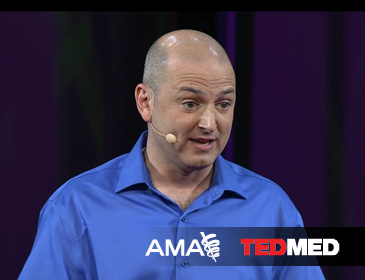In the health care system of tomorrow, physicians and patients will be playing many more games, according to some speakers with innovative ideas at TEDMED 2014, which took place last month in San Francisco and Washington, D.C.
Giving medical students the opportunity for some hands-on gaming, particularly simulations, is part of the future, said Carla Pugh, MD, vice chair of education and patient safety at the University of Wisconsin School of Medicine and Public Health and clinical director of the University of Wisconsin Health Clinical Simulation Program.
Dr. Pugh found the lack of haptic experience offered in medical school and residency to be challenging, so she researched the use of sensor and data acquisition technology to measure and characterize the sense of touch. Her E-Pelvis is an electronic pelvic mannequin attached to a computer monitor. Students practice pelvic exams on the device, and instructors can see the location and intensity of the students’ touch.
“Reading about how to do a pelvic exam and then actually trying to do it, there’s so much that’s lost in translation,” Dr. Pugh said. “I think that everybody’s ready to kind of change the direction and the way in which we train and learn, and there’s so many things that are available right now. We just need to embrace them.”
Physicians in training aren’t the only ones to benefit from games—simulations can help patients in ways other therapies sometimes can’t, said Howard Rose, president of Firsthand Technology, a 3D game and simulation developer.
Mental health patients are using games to confront phobias, such as a fear of spiders, by placing patients into virtual situations with their fears. Patients with severe burns can play a therapeutic game that immerses them in a snowy, cold environment. Immersive simulations, such as a game set in Iraq, lets veterans return to virtual battle to reduce post-traumatic stress disorder.
“The act of play, overcoming these challenges through trial and error, recalibrates our perceptions,” Rose said. “It’s time for us to embrace this technology and use this opportunity for health. … What if instead of prescribing drugs to mask pain or poor health habits, you prescribe virtual reality games for building resilience, bringing relief and changing health habits?”
Video gaming may be useful to improve health outcomes, said Brian Primack, MD, associate professor of medicine, pediatrics, and clinical and translational science at the University of Pittsburgh School of Medicine. In his talk, Dr. Primack said the current state of technology is only scratching the surface of gaming’s potential to improve health.
“The video game industry is really good at getting people to perform certain tasks and stick with them for the long haul,” Dr. Primack said. But it won’t be easy, he added.
“There is huge potential here,” he said. “We’re going to have to carefully apply principles. We’re going to need to get much more serious about games.”
Watch these speakers give their talks at TEDMED 2014
Visit the TEDMED 2014 website and enter invitation code “TMLicAMA14.” Once you’ve logged in to the on-demand streaming, find the appropriate video:
- For the beginning of Dr. Pugh’s talk, find the “Play is not a waste of time” video and go to 32:59.
- For the beginning of Rose’s talk, find the “Play is not a waste of time” video and go to 1:28:47.
- For the beginning of Dr. Primack’s talk, find the “Stealing smart – San Francisco stage” video and go to 02:24.
View additional talks by other physicians, health care leaders and innovators through Oct. 10.
The AMA is a Global Institution Partner of TEDMED 2014, an association that makes this complimentary access to on-demand streaming possible.





